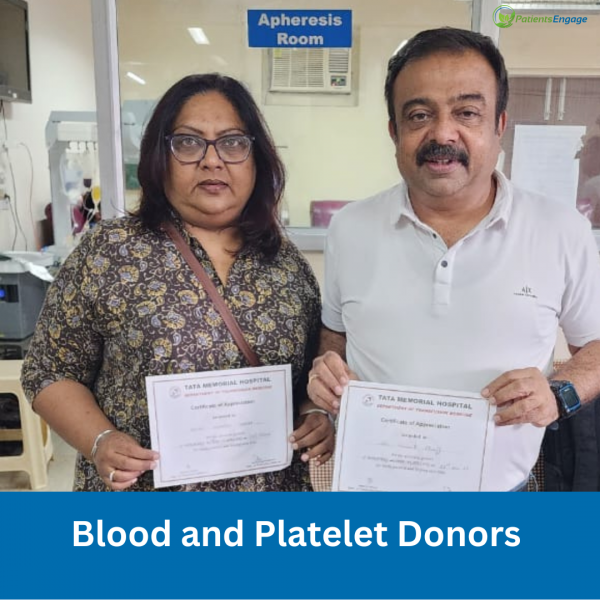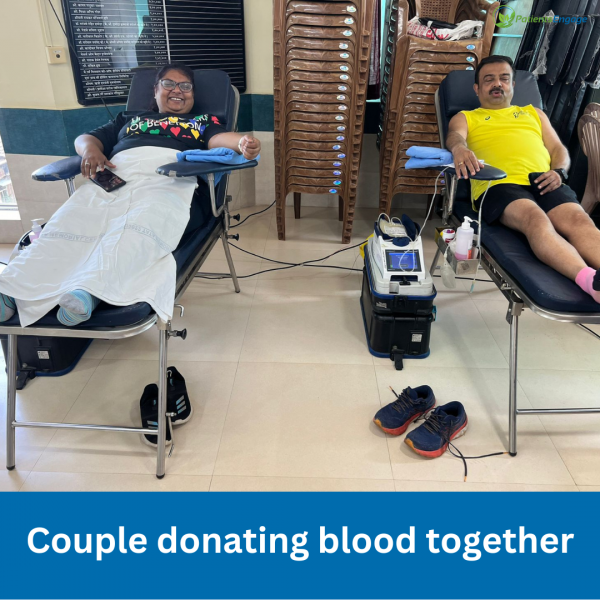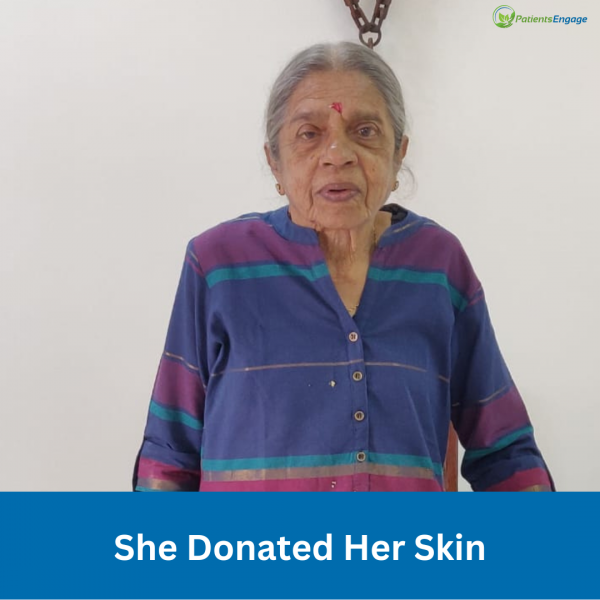
Mr. Hemant Shroff, a blood donor for the last four decades has been working to create awareness about the lesser-known but crucial need for platelet donation and skin donation. He spoke to us about his journey and his efforts to bring these important issues into the limelight.
When did you donate blood for the first time and why? What has been your motivation to continue donating blood over so many decades?
I donated blood for the first time at the age of 20 when I was studying at K. J. Somaiya College of Engineering. I was inspired by my Mathematics professor, Mrs. Nalini Kumthekar who was also a social worker. I continued to donate blood for all the 4 years that I was in Engineering college. That started my journey. I am 59 years old now and I have donated blood 110 times since that first time.
Once I started donating blood regularly, I was added to donor lists and got calls inviting me to blood donation camps. After a certain age I felt the need to give back to society. I feel a higher power motivated me to continue doing this work. I feel happy that my act of donating blood helps critically ill people in their time of need.
Blood donation is anonymous. You don’t know who gets your blood. This means you have no ‘Karma Abhiman’ i.e., you don’t have any pride or ego identified with your act. It remains selfless. This is important to me.

Does blood donation have any side effects?
Blood donation has no side effects or any adverse effects on your health. I learnt from the doctors that regularly donating blood makes your regenerative system more powerful and your body is able to make new blood much faster.
How do you keep yourself fit to be able to donate blood every 3-4 months?
When you go for blood donation, you have to fill a form. Your BP and hemoglobin are measured, and it becomes an automatic check of your fitness levels.
I have always been very keen on physical fitness. I am a marathon runner. I have completed the full marathon (42 kms) thirteen times and the half marathon (21 kms) more than a hundred times. This needs a lot of weight training. I control my food intake. My wife, (who is also a runner), and I make sure our diet is healthy and includes foods such as curd, bajri, jowar, green vegetables such as spinach and methi, anjeer and dates as well even though they have a higher sugar content. I am a vegetarian, but I eat eggs. I believe that if you make less mistakes in your food habits you will stay fit.
What does your family feel about your regular blood donation?
My wife Hetal joins me in donating blood. She has donated blood 35 times so far. Women donors are fewer as their hemoglobin count is lower. But she takes good care of her diet and fitness levels. She walks, runs and does weight training as well. Due to her healthy lifestyle, she is always selected for blood donation.
Related Reading : Blood Donation Guidelines

How do you encourage others to donate blood?
I have a bunch of friends who run with me, and they all have started donating blood. Gradually more people in the running community have joined us and the numbers are increasing. In my ecosystem everyone knows that I regularly donate blood and I use that to further the cause. I use my social media accounts such as FB and Insta as well as my WhatsApp groups to increase awareness.
I collect invites of blood donation camps and share them on FB and my WhatsApp groups. Photos are big motivators, so I make sure that I share photos of groups of people with their blood donor certificates. Some blood donation camps have a selfie point which is a good place to take photos to encourage others to join the cause. My messages list the people who participated in the camps. This helps to motivate the others in my WhatsApp groups to do the same another time.
I have been associated with the Nana Palkar Smriti Samiti at Lower Parel, Mumbai for quite a long time. This institution is like a temple to me. They have been organizing blood donation camps for more than 35 years. I donate blood in their camps twice a year and share their camp information on my social media and groups. The aim is to get repeat donors as well as to welcome new donors into the fold. At least 40-50 new people have joined up. It is very important to share the information as widely as possible as the success rate of people turning up is about 20%.
Do you see any changes in blood donation trends over the years?
People are fearless now about donating blood and far more people do so than before. These days blood donation camps collect between 1300-1500 bottles of blood. That is a pretty large amount.
How do you think this change has come about?
The Government has increased awareness about blood donation though various campaigns with catchy slogans such as ‘Raktadan Jeevandan’ (Donating Blood is Donating Life). Various awareness programs are also conducted on 14 June which is World Blood Donation Day. This year the slogan for World Blood Donation Day is “Give Blood and Keep the World Beating.”
The Government bodies also support organizations who organize blood donation camps. These institutions collect data of those who have donated and reach out to them when they organize other camps.
Could you tell us more about Platelet Donation:
Around 3-4 years ago I learnt about platelet donation from a fellow runner. Platelet collection is done at a few places such as Tata Memorial Hospital at Parel where I go to donate.
Platelet donation is crucial for cancer patients, dengue patients and trauma accident cases. Despite the high demand there is a shortage of platelets, and the Tata team urges people to come forward and contribute. Daily 20-30 people donate platelets, some travelling from as far as Shirdi and Manmad only for this purpose.
How do you start donating platelets?
The standards for platelet collection are higher than that of blood collection. There are some criteria you have to meet. After clearing the required tests, you can start donating platelets
How often can you donate platelets?
You can donate every 2 weeks, but it should not be more than 24 times in a year.
What is the process of platelet donation?
It takes an hour to give platelets. That is longer than blood donation. You have to lie still for that hour. The blood passes through a machine and the platelets are collected through a centrifugal force. 40,000 platelets are extracted and from that 250 gms of plasma is collected.
Platelets live only up to 5 days after collection, so they have to be delivered to patients quickly. They are needed by cancer patients, dengue affected and accident victims. One platelet donation can save 2-3 patients.
Some donors who are stronger with a count of more than 400,000 platelets stay for 1.5 hours and donate double the number of platelets.
The platelet donation is safe. It is done with imported 100% disposable kits
I know of a few dedicated people like Mr. Gadigaonkar who has donated platelets more than 390 times by now
How do you increase awareness of platelet donation?
There is a severe shortage of platelets and I do my best to increase awareness like I do for blood donation by sharing information on my social media accounts and on WhatsApp groups as well. I am happy that I have managed to get at least 20 more donors to Tata Memorial Hospital to donate platelets.
You are also trying to raise awareness on skin donation. Can you tell us more about that?
I came to know about skin donation through the blood donation ecosystem. My beloved 87-year-old mother Mrs. Manjula Shroff passed away on March 2, 2024, and we decided to donate her skin after getting more information about it.
Skin is used to heal burns patients and is in short supply. We donated my mother’s skin to the Bhikoo S. Kharas Memorial Skin Bank at Masina Hospital. Post this, my daughter Prachi, my friend and I have all decided to donate our heart, liver, kidney, eyes and skin post our death. We all have donor cards that you can get by filling a form at a hospital.

What is the process of skin donation?
When you want to donate the skin of a deceased person you have to send a photo of the skin to the hospital to check for eligibility. The team from the hospital comes and collects the skin from the arms and thighs using a small machine. There is no disfigurement.
How can we contact the Trust?
You can reach them at Masina Hospital Byculla. The telephone number is 022-23700715. Email id: info@masinahospital.com
You also donated your mother’s body to Nair hospital.
Yes, we decided to donate her body to the Nair hospital Anatomy department for research and education purposes. The hospital and the BMC were very grateful for our donation and issued the death certificate to us within 36 hours. I believe that this is a service to humanity.






